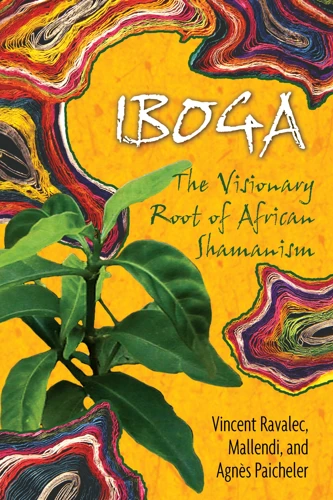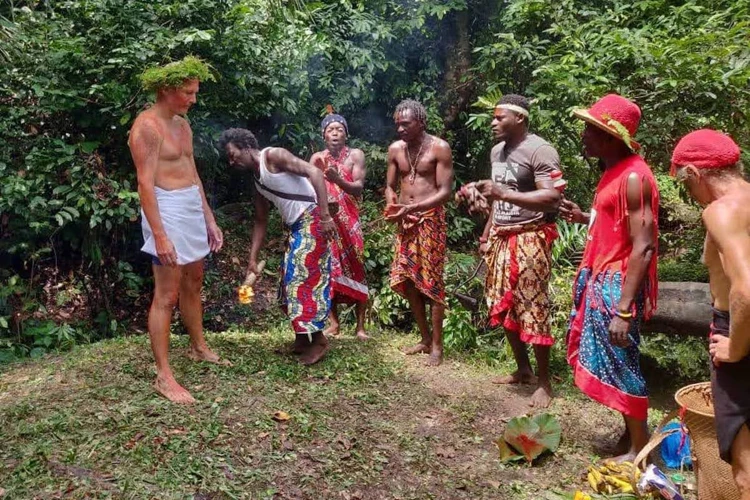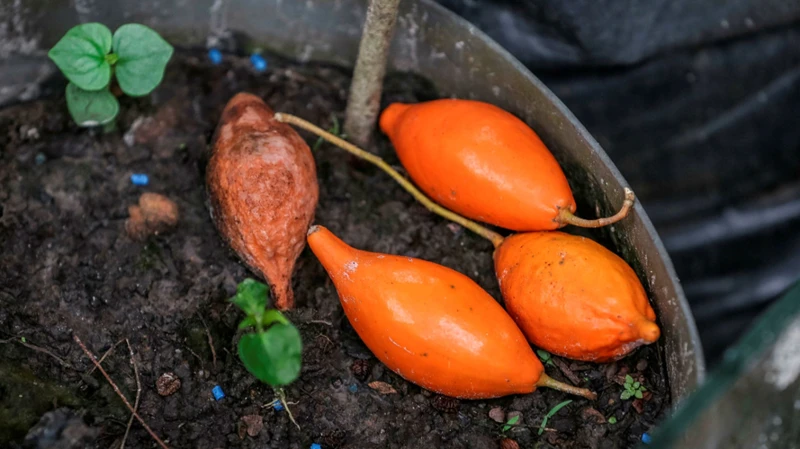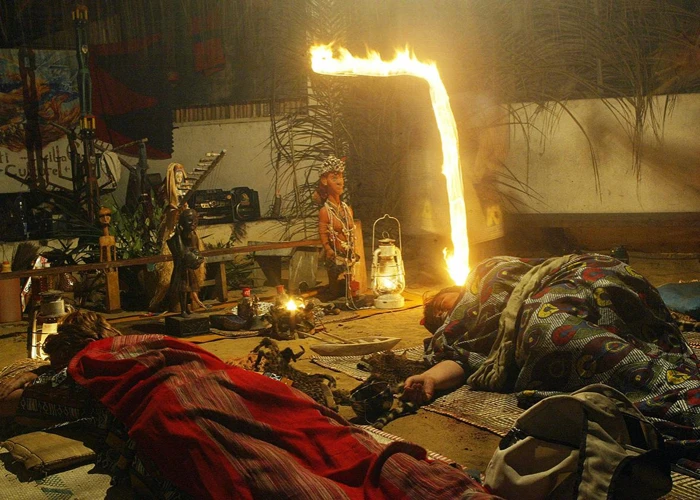The first time you hear of iboga root might leave a lot of questions in your mind. What is the root used for? Who uses it? Why is it important? In this article, we will delve into the history of iboga root, its traditional use in ceremonies, the healing properties it possesses, and the controversy and risks surrounding it. The iboga plant has played a vital role in the Bwiti religion of Gabon for centuries, with traditional ceremonies involving its use for healing and spiritual purposes. The spread of its use beyond Africa has brought with it controversy and legal implications. Nevertheless, the healing properties of iboga are still acknowledged by many, including those who use it to combat addiction and mental health issues. Join us on an exploration of the past, present, and future of this mysterious root.
The Origins of Iboga Root

The history of iboga root is shrouded in mystery, with its origins dating back to ancient times in central Africa. The use of iboga root in traditional ceremonies and healing practices of the Bwiti tribe has been passed down for generations, with its spiritual significance deeply ingrained in their culture. The knowledge of iboga root’s psychoactive properties has been recently discovered by modern researchers, leading to its spread outside of Africa. Despite its growing popularity, iboga root remains controversial due to its potential risks and legal status in many countries.
The Spiritual Significance in Bwiti Religion
The use of iboga in the Bwiti religion dates back thousands of years and holds great spiritual significance for its followers. The Bwiti people believe that the iboga plant is a direct link to the spirit world and can help them communicate with their ancestors and other spiritual entities.
During Bwiti ceremonies, iboga root is ingested in large quantities, often accompanied by chanting, dancing, and other ritualistic practices. The effects of the plant can last for up to 24 hours and are said to induce a state of heightened spiritual awareness and connection.
- The iboga plant is a direct link to the spirit world
- Iboga can facilitate communication with ancestors and other spiritual entities
- Iboga can induce a heightened state of spiritual awareness
In Bwiti culture, iboga is also used during rites of passage, such as initiation ceremonies, to mark important life events and facilitate spiritual growth. The Bwiti believe that iboga can help individuals gain clarity and insight into their own lives and the world around them.
The spiritual significance of iboga in the Bwiti religion cannot be overstated, as it plays a central role in many important traditions and practices of the Bwiti people.
The Spread of Iboga Use Outside Africa
The spread of Iboga use outside Africa is a topic of intense controversy and discussion. While Iboga has been used in Africa for centuries, its introduction to the Western world has been relatively recent. In the 19th century, European colonizers first encountered Iboga and began to acquire it for trade and personal use. Today, Iboga is increasingly popular in the West, including North America and Europe.
The spread of Iboga use outside of Africa is both an opportunity and a challenge. On the one hand, greater awareness of the plant’s healing properties has led to more research and experimentation on its use in modern medicine. On the other hand, there is concern about the safety of using Iboga outside of traditional cultural contexts, as well as the issue of cultural appropriation.
One of the most controversial practices involving Iboga is the use of the plant in non-traditional settings, such as in therapy and addiction treatment. While some have reported positive outcomes, there are also documented cases of serious health problems and even death resulting from Iboga use outside of traditional ceremonial contexts.
Despite the risks, many people continue to seek out Iboga for its perceived benefits, including spiritual growth, physical healing, and relief from addiction. As the global demand for Iboga continues to grow, it is important to approach its use with caution and respect for the plant’s traditional cultural origins. It is important to understand the potential risks and take appropriate precautions when using Iboga for healing purposes.
Traditional Iboga Ceremonies

The use of Iboga root in traditional ceremonies has been an important part of the Bwiti religion in Central Africa for centuries. These ceremonies are deeply spiritual and are believed to have powerful healing properties. The importance of the Bwiti ceremony cannot be understated as it plays a significant role in the lives of the people who practice this religion. In this section, we will explore the key aspects of traditional Iboga ceremonies, including the initiation ceremony and the role of the shaman in healing. Get ready to delve deeper into the spiritual world of the Bwiti religion and the profound influence of Iboga root.
The Importance of the Bwiti Ceremony
The Bwiti Ceremony is a traditional ceremony of the Bwiti religion that is centered around the use of Iboga root. It is a sacred and important ritual that has been practiced for centuries in Africa. During this ceremony, participants consume the Iboga root which is believed to lead them on a journey of self-discovery and healing. The experience is guided by a shaman, who is responsible for ensuring the safety of the participants and helping them navigate through the trip.
The Significance of the Bwiti Ceremony
The Bwiti ceremony is not merely a recreational activity, it is a spiritual journey that has deep significance for the Bwiti people. It is a ritual that is meant to connect individuals to their ancestors and help them gain a better understanding of their place in the world. The ceremony is also believed to have the power to heal and transform individuals on a psychological and emotional level.
The Role of Iboga in the Ceremony
The Iboga root is the key element in the Bwiti ceremony. It is a sacred plant that is believed to have the power to connect individuals to the divine realm. The plant contains ibogaine, which is a psychoactive substance that induces a state of heightened awareness and introspection. When consumed, the plant is believed to allow individuals to connect with their inner selves, access hidden knowledge, and gain insight into their lives.
The Role of the Shaman
The shaman plays a crucial role in the Bwiti ceremony. They are responsible for guiding participants through the experience and ensuring their safety. The shaman also provides spiritual insights and wisdom that can help individuals better understand their experiences. The role of the shaman is to provide a safe and supportive environment where participants can explore the depths of their psyche and gain a deeper understanding of themselves and the world around them.
The Importance of Respect and Reverence
The Bwiti ceremony is a deeply spiritual experience that requires participants to approach it with respect and reverence. The ceremony is not a recreational activity or a party, it is a journey that demands a certain level of seriousness and intention. Participants are encouraged to approach the experience with an open mind and a willingness to learn from the plant and the shaman.
The Challenge of Navigating the Self
The Bwiti ceremony is a powerful experience that can be challenging for some individuals. The journey can be emotionally intense, and participants may confront difficult emotions and memories during the trip. This can be a challenging and transformative experience that involves a great deal of introspection and self-exploration. However, for those who are willing to navigate this challenge, the reward can be an increased sense of self-awareness, inner peace, and healing.
Exploring the Bwiti Initiation Ceremony
As part of the Bwiti initiation ceremony, the iboga root is consumed in a carefully controlled setting. The ceremony itself involves several stages, with participants consuming different doses of iboga over a period of several days. Here is a breakdown of the various stages of the ceremony:
- First Night: On the first night of the ceremony, participants consume a small amount of iboga root to get a sense of its effects. This is often referred to as the “test dose” as it allows the shaman to determine each person’s sensitivity to the plant.
- Second Night: On the second night, participants consume a larger dose of iboga, which induces a state of heightened awareness and introspection. This stage is often referred to as the “voyage” and can last up to 24 hours. During this time, the individual experiences intense hallucinations and visions.
- Third Night: On the third and final night of the ceremony, participants consume a smaller dose of iboga, which allows them to reflect on the visions and insights gained during the previous night’s voyage. This stage is often referred to as the “reintegration” stage and marks the conclusion of the ceremony.
Throughout the ceremony, the shaman plays a crucial role as a guide, mediator, and facilitator. The shaman helps participants navigate their experiences and interpret the visions and insights gained during the ceremony. They also provide emotional support and ensure the safety and well-being of each participant.
The Bwiti initiation ceremony is seen as a rite of passage, marking the transition from adolescence to adulthood. It is a deeply spiritual experience that connects individuals to their ancestors and the divine. It is believed that the ceremony has the power to heal both physical and psychological ailments and to provide guidance and direction for one’s life path.
Healing with Iboga: The Role of the Shaman
The shaman plays a crucial role in traditional iboga ceremonies. Here are the key aspects of their role in healing with iboga:
- Preparing the Participant: Before the ceremony, the shaman guides the participant through a period of preparation, which can last for several weeks. This preparation involves dietary restrictions, meditation, and other spiritual practices to help the participant focus their intention and open themselves to the healing effects of iboga.
- Leading the Ceremony: The shaman leads the ceremony, which can last for up to 24 hours or more. During the ceremony, the participant ingests the iboga root, and the shaman provides guidance and support as the participant experiences the intense visions and physical sensations that come with the iboga experience.
- Interpreting the Visions: The visions that participants experience during an iboga ceremony are often complex and difficult to understand. The shaman helps the participant interpret their visions, using their knowledge of Bwiti mythology and symbolism to help the participant gain insights into their own life and experiences.
- Providing Emotional Support: The iboga experience can be emotionally intense, and the shaman provides emotional support to the participant throughout the ceremony. This can involve talking to the participant, holding their hand, or providing other forms of physical or emotional support.
- Ensuring Safety: Iboga can be a powerful and potentially dangerous substance, and it is the shaman’s responsibility to ensure the safety of the participant. This can involve monitoring the participant’s physical health, administering first aid if necessary, and knowing when to seek medical help if the participant experiences severe adverse effects.
The shaman plays a crucial role in the traditional use of iboga as a healing plant. Their guidance and support, combined with the plant’s psychoactive effects, can help participants gain insights into their lives, overcome emotional blockages, and experience profound healing.
The Healing Properties of Iboga Root

When it comes to the healing properties of Iboga Root, there is a wealth of knowledge and experience that has been passed down through generations of practitioners in Africa. This powerful plant has been used for centuries to address a wide range of physical and psychological ailments, and its reputation as a potent healing tool has spread throughout the world. However, there are also risks associated with its use, and controversy surrounding its legality in various countries. In this section of the article, we will explore the potential benefits and drawbacks of using Iboga Root for healing, as well as the traditions and practices that have made it such a valued tool for those seeking spiritual and physical wellness.
The Psychological Benefits of Iboga
Iboga root has been used for centuries as a tool for psychological healing. Here are some of the psychological benefits that iboga can provide:
- Clarity and Insight: Taking iboga root can give an individual a new level of clarity and insight into their thoughts and actions. This heightened level of understanding can lead to increased self-awareness and a deeper overall understanding of life.
- Emotional Healing: Iboga can help individuals process and heal from past emotional wounds, such as trauma or grief. It can also help individuals release negative emotions, such as anger or fear.
- Spiritual Connection: Iboga can give individuals a sense of connection to something larger than themselves. This can help individuals find meaning and purpose in their lives, and feel more connected to the world around them.
- Breaking Addictions: Iboga has shown promise as a tool for breaking addictions, particularly to substances like alcohol, opioids, and nicotine. It has been shown to help with withdrawal symptoms and reduce cravings.
- Increasing Creativity: Some individuals report that taking iboga enhances their creativity and helps them to think more outside the box.
It is important to note that while iboga can be a powerful tool for psychological healing, it should always be taken under the guidance of a trained and experienced shaman. Iboga can bring up intense emotions and can be overwhelming for some individuals. It is important to have the support and guidance of a shaman who can help navigate the experience and provide a safe space for healing to occur.
Physical Benefits of Iboga
Iboga root has been known to have various physical benefits in addition to its spiritual and psychological properties. Here are some of the physical benefits of iboga:
| Physical Benefit | Description |
|---|---|
| Anti-inflammatory properties | Iboga root has been found to contain anti-inflammatory compounds that can help reduce inflammation in the body. Inflammation is often associated with a variety of health conditions like arthritis, cardiovascular disease, and even cancer. |
| Analgesic effects | Iboga has pain-relieving properties and has been known to help manage chronic pain conditions. Additionally, in African traditional medicine, iboga is used as a local anesthetic. |
| Stimulant properties | Iboga contains several alkaloids that act as stimulants. These alkaloids stimulate the central nervous system and produce a state of alertness which can be beneficial in treating conditions like fatigue and depression. |
| Cardiovascular benefits | Studies have shown that ibogaine, an active compound found in iboga, has cardiovascular benefits. Ibogaine has been shown to reduce blood pressure, improve heart function, and reduce the risk of heart failure. |
| Detoxification properties | Iboga has been used for centuries in African traditional medicine as a cleansing agent. It is believed to help in the detoxification of the body by flushing out toxins and other harmful substances from the body, especially the liver. |
It’s important to note that the physical benefits of iboga have not been extensively researched, and further studies are necessary to understand its full potential in treating physical health conditions. It’s recommended that any use of iboga for physical health concerns is done under the guidance of a medical professional.
The Risks and Controversy Surrounding Iboga Root
As with any powerful plant medicine, there are potential risks and controversy surrounding the use of iboga root. While it has been used traditionally for centuries in Bwiti ceremonies without harmful effects, the modern use of iboga, particularly in non-traditional settings, has led to some concerning outcomes. Additionally, the legal status of iboga varies widely across different countries, further complicating the issue. In this section, we will explore the risks and controversy surrounding the use of iboga root.
Legal Status of Iboga in Different Countries
The legal status of Iboga root and its active compound ibogaine varies greatly depending on the country. Here are some examples:
Legal:
- In Gabon, where Iboga is found naturally and is a central part of the Bwiti religion, it is legal to possess and consume Iboga in traditional ceremonies.
- In Brazil, Iboga is legal for religious use by established religious organizations.
- In South Africa, Iboga is legal for use in traditional healing ceremonies.
Gray Area:
- In Canada and Mexico, Iboga and ibogaine are not currently regulated, but they are also not approved for medical use.
- In the Netherlands, Iboga and ibogaine are considered a “novel psychoactive substance” and are illegal under Dutch drug laws.
- In the United Kingdom, ibogaine is a Class A drug, which means it is illegal to possess, distribute, or produce. However, recently, some treatment centers have been granted a special license to use it as an experimental treatment for addiction.
Illegal:
- In the United States, ibogaine is classified as a Schedule I substance, meaning it is considered to have a high potential for abuse and no currently accepted medical use.
- In Australia, ibogaine is considered a Schedule 9 drug, indicating it has no therapeutic use and is prohibited under all circumstances.
It is important to note that Iboga and ibogaine are not approved by the FDA for any medical use in the United States, and possession and use of these substances can result in criminal charges. It is important to research the legal status of Iboga in your country before deciding to use it for any purpose.
The Dangers of Iboga Use
While iboga root has been traditionally used for healing purposes, it is important to be aware of its potential dangers. Here are some of the safety concerns surrounding iboga use:
- Cardiovascular Risks: Iboga can cause changes in heart rate and blood pressure, which can be particularly dangerous for those with pre-existing cardiac conditions. There have been cases of fatalities associated with iboga use in people with heart problems.
- Choking Hazards: Iboga can cause vomiting and diarrhea, which can be dangerous if someone is not properly attended to. There have been instances of people choking on their vomit during iboga ceremonies, which highlights the necessity of having a trained shaman or guide present.
- Psychological Risks: While iboga is often used to treat addiction and other mental health issues, it can also trigger intense psychological experiences that may be overwhelming for some. In rare cases, people have reported persisting psychotic symptoms after taking iboga.
- Interactions with Other Substances: Iboga can have dangerous interactions with other drugs, particularly stimulants and antidepressants. If someone is taking any prescription drugs, it is important to consult a healthcare provider before taking iboga.
- Legal Concerns: Iboga is a controlled substance in many countries, which means that using it can lead to legal repercussions. In some cases, people have been arrested and imprisoned for possession of iboga.
While it is important to be aware of these potential risks, it is also important to remember that iboga can be used safely and effectively when used responsibly and under the guidance of a trained shaman or practitioner.
Conclusion
After exploring the history, traditional use, and healing properties of iboga root, it is clear that this plant holds great significance in various cultures and has been used for centuries in spiritual ceremonies and healing practices. However, it is also important to address the risks and controversies surrounding iboga use.
Despite its potential benefits, iboga can be dangerous if not used appropriately, and it is crucial for individuals to seek out experienced shamans and reputable centers if they choose to participate in iboga ceremonies. Additionally, the legal status of iboga varies across different countries, and individuals should be aware of the legal risks associated with possession and consumption.
Overall, while iboga root has the potential to be a powerful tool for spiritual growth and personal healing, it should always be approached with caution and respect. Its traditional use within the context of Bwiti ceremonies should also be respected and acknowledged, as this is an important aspect of the cultural and spiritual heritage of those who have been using iboga for generations.
In conclusion, iboga root is a fascinating plant that has played a significant role in various cultural and spiritual practices. However, it should always be used with caution and respect, and individuals should take the necessary precautions to ensure their safety and well-being.
Frequently Asked Questions
What are the origins of iboga root?
Iboga root comes from the Tabernanthe iboga plant, which is native to West and Central Africa.
What is the spiritual significance of iboga root in Bwiti religion?
Iboga root is considered a sacred plant that helps connect individuals with their ancestors and the spirit world in Bwiti religion.
How has iboga use spread outside of Africa?
Iboga use has spread through the popularity of “ibogaine treatment” – a modern form of treatment that uses ibogaine, derived from the iboga root, to help those dealing with drug addiction.
What is the Bwiti ceremony?
The Bwiti ceremony is a traditional initiation ceremony in which individuals take iboga in order to connect with the spirit world and gain spiritual insight.
What is the role of the shaman in iboga ceremonies?
The shaman is responsible for leading the ceremony and facilitating a safe and meaningful experience for participants.
What are the psychological benefits of iboga use?
Iboga has been used as a tool for mental and emotional healing, leading to benefits such as increased clarity, self-awareness, and trauma resolution.
What are the physical benefits of iboga?
Iboga has been used in traditional medicine to treat a variety of physical ailments, such as fever, headache, and muscle pain.
What is the legal status of iboga in different countries?
The legality of iboga varies greatly by country, with some countries banning its use while others permit it for certain purposes, such as traditional medicine.
What are the dangers of iboga use?
Iboga can be dangerous if used improperly, as high doses may lead to severe hallucinations, heart complications, and even death.
What is the controversy surrounding iboga root?
The controversy surrounding iboga root stems from the lack of regulation and guidance surrounding its use, leading to potential risks and abuse.








